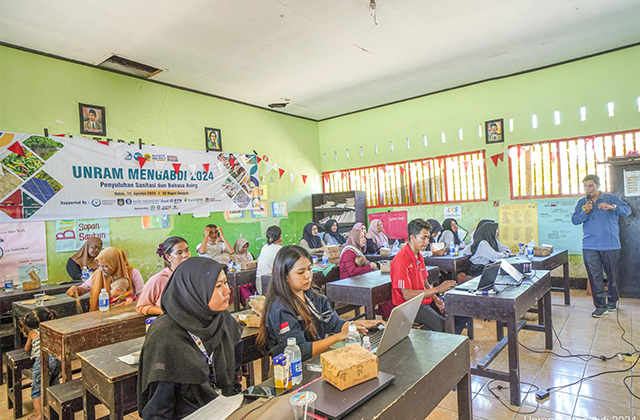LPPM Unram Educates on Stunting Prevention and Early Marriage in Sengkol Village

Mataram, University of Mataram – The Research and Community Service Institute of the University of Mataram (LPPM Unram) held a Socialization of Stunting Prevention and Early Marriage which is part of the Unram Mengabdi series. This activity was held in the Hall of State Elementary and Junior High School 13 One Roof Sengkol Village, Central Lombok Regency, attended by 20 participants consisting of housewives and students.
On this occasion, the Director of Unram Hospital, Dr. dr. Lina Nurbaiti, M.Kes, FISPH, FISCM; Prof. Dr. Ir. Ruth Stella Petrunella Thei, MS.; Dr. Abdul Atsar, SH, MH; and several staff of LPPM Unram attended.
As part of the implementation of the Tri Dharma of Higher Education, this Unram Mengabdi activity aims to provide education and important information about stunting prevention and the risk of underage marriage to the local community. In this training, participants will gain knowledge about the factors that cause stunting, such as poor nutrition and unhealthy diets, and how to prevent stunting through a good diet and proper health care. In addition, the training will also discuss the impact of underage marriage on children’s health and well-being and strategies to prevent the practice.
In her presentation, Dr. Lina said, “Stunting, which is characterized by stunted growth in children due to chronic malnutrition, is a serious health problem that can have a long-term impact on children’s physical and cognitive development.”
Stunting can be caused by various factors, including lack of adequate nutrition, recurrent infections, and unfavorable socio-economic conditions.
“Maternal health during pregnancy and exclusive breastfeeding in the first 6 months of a child’s life are key to preventing stunting. In addition, a balanced diet and hygiene practices are also very important,” said Dr. Lina.
The socialization involved various activities, ranging from seminars on balanced nutrition and the importance of immunization, to hands-on demonstrations on how to prepare nutritious meals with local ingredients. Participants were also given information on the early signs of stunting and intervention steps that can be taken at home. In addition, research revealed that one of the main factors contributing to stunting is early marriage, which often results in pregnancy at an immature age and increases health risks for both mother and child.
Prof. Stella highlights the link between early marriage and high rates of stunting, “Early marriage often occurs before a woman is physically and mentally ready for motherhood. Pregnancy at a young age can lead to malnutrition for the mother, which then has a direct impact on the growth and development of the child.”
“To achieve a significant reduction in stunting, we need to pay attention to contributing social factors, including early marriage. Through prevention and awareness programs, we hope to reduce the incidence of early marriage and, in turn, reduce stunting rates,” said Prof. Stella.
It is important to understand that marriage age regulations are not only a legal norm, but also an instrument to protect children’s rights and prevent adverse health impacts. Strict enforcement of these violations is a crucial step in reducing early marriage rates.
During the event, participants were also provided with information on reporting mechanisms and steps that can be taken if they encounter cases of early marriage. In addition, there was a question and answer session on the role of the community in enforcing the law and supporting the prevention of early marriage.
“When people have a good understanding of the law and the negative impacts of early marriage, they can play an active role in preventing the practice and reporting it to the authorities,” added Dr. Abdul Atsar.
The event received a positive response from various parts of the community, including representatives from communities and housewives. One of the participants, Mrs. Dinda, said, “This event is very useful because it provides a deeper understanding of the law and how to protect children from early marriage, in addition I also gained new knowledge about good intake patterns for children from local food around me. I will disseminate this information to the community.”
Head of LPPM Unram, Prof. Sukartono, in his interview said, “Today we have witnessed the importance of synergy between the academic world and the community in overcoming significant health challenges. The Unram Mengabdi activity with the theme of preventing stunting and early marriage in Sengkol Village is a concrete example of the commitment of the University of Mataram in contributing to the solution of social and public health problems.”
He continued, “We would like to thank all parties who have participated in this activity, from lecturers, students, to the people of Sengkol Village. Their support and enthusiasm are invaluable in achieving our common goal. We are also grateful to the village government and related parties who have provided good facilities and cooperation.”
